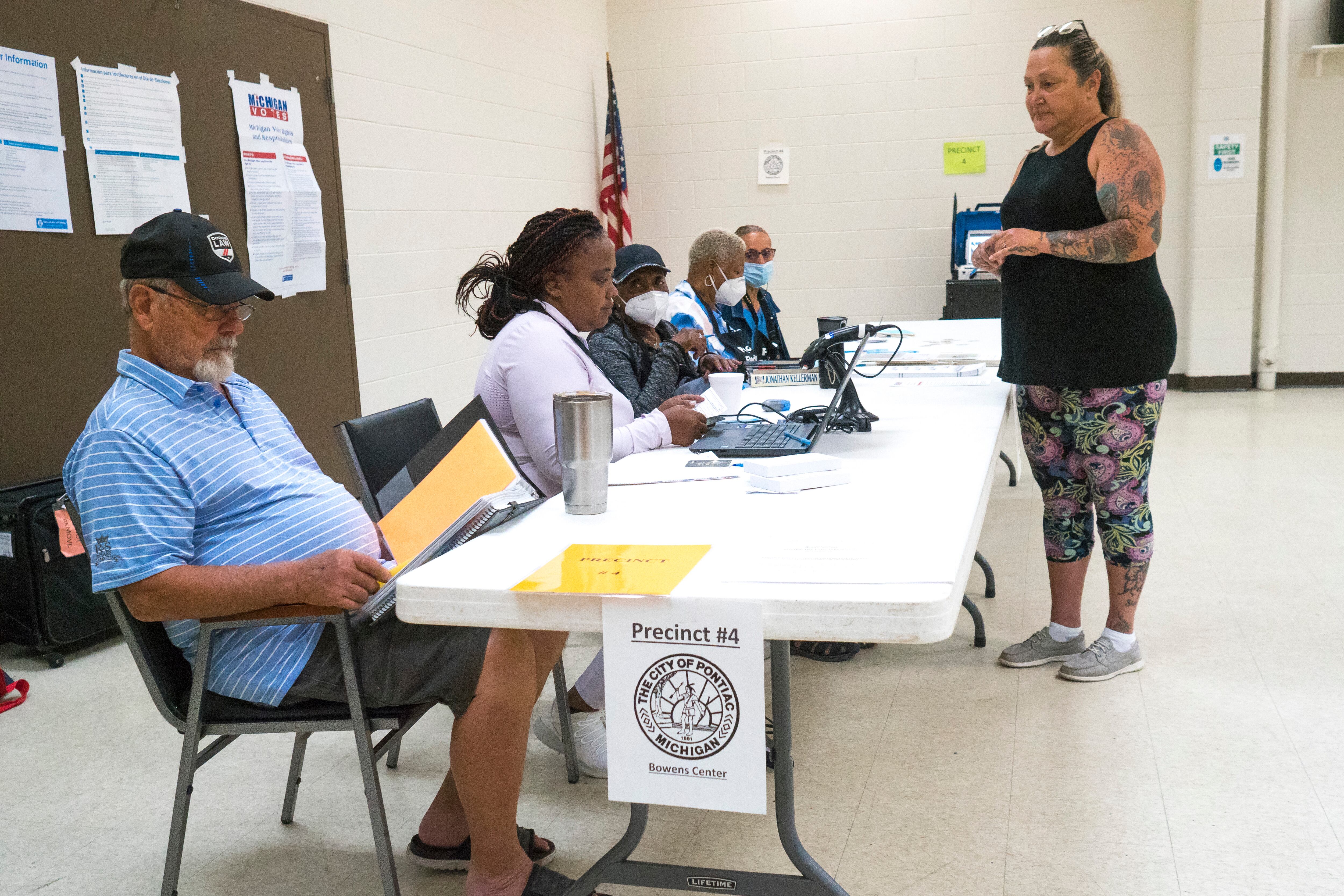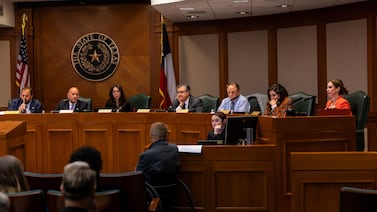As Michigan election officials prepare to remove nearly 100,000 potentially ineligible voters as part of its periodic cleanup of the registration rolls, they are turning to local clerks and community groups to check their work and ensure no eligible voters are improperly removed.
Clerks and other election officials have been scouring Social Security death records and local obituaries to ensure that people flagged as deceased are truly dead.
Meanwhile, local community groups that the secretary of state’s office refers to as “democracy partners,” including Pontiac-based Oakland Forward, are inspecting the lists of voters to potentially be removed to see if any neighbors or familiar names are incorrectly flagged as having moved away.
“We are trying to make sure that as many people as possible actually stay on the voting rolls and [understand] that they need to update their registration,” said Kermit Williams, the executive director of Oakland Forward, a nonprofit community organization that’s part of the Promote the Vote coalition of organizations.
Williams said he and 12 staffers will be inspecting the rolls. The staff members and volunteers will then canvass neighborhoods in person in Oakland County to alert residents that they are on the list for removal. They will also help them contact the local clerk or secretary of state’s office to update their registration and avoid being removed from the voter rolls.
Oakland Forward is also contacting inactive voters and asking them to visit the state’s voter registration website to make sure their registration is up-to-date and prevent themselves from being flagged for cancellation in the future.
“We want to make sure not only is it accurate, but we want to make sure that it’s not disproportionately affecting people in front of this presidential election,” Williams said. “It’s going to be very critical to make sure that everybody who wants to cast a vote can vote.”
Election officials at the Michigan secretary of state’s office and the Bureau of Elections say removing voters who don’t belong on the rolls — officially called the Qualified Voter File — is part of their federally mandated efforts to prevent fraudulent voting by making sure the file is clear of deceased voters or those who have moved out of state.
Out of Michigan’s 8.2 million registered voters, nearly 100,000 voter registrations are up for cancellation. They include voters no longer living at addresses where they had been registered or those who have surrendered their Michigan driver’s license to another state. In such cases, election officials received a returned mailing or other information giving them reason to believe the individual had changed their address.
Keeping voter rolls updated also helps election officials from wasting resources on mailings to voters who have moved or died.
The tools of voter roll maintenance
One of the essential tools officials use to start identifying voters for removal is the Electronic Registration Information Center, known as ERIC. The program is a partnership that collects and matches voter registration data from more than 30 states to look for duplicate registrations that indicate a voter has moved from one state to another and thus has become ineligible to vote at their previous location. It also uses Social Security death data to flag voters who have died. Member states submit their voter registration data to ERIC every 60 days to help maintain accuracy and to prevent voter fraud.
Michigan joined ERIC in 2019, and Michigan’s director of elections, Jonathan Brater, is the program’s board chairman. Far-right conspiracy theories about ERIC have recently prompted some member states’ Republican officials to criticize the program, without evidence, as funded and controlled by liberal activists who compromise the integrity of states’ rolls. Five states have withdrawn from the partnership lately, including three last week: Florida, Missouri, and West Virginia. Some other states, including Texas, are under pressure to withdraw. One state, New Jersey, joined ERIC last year.
ERIC’s executive director, Shane Hamlin, rebutted the false claims about the program, saying, “Members retain complete control over their voter rolls and they use the reports we provide in ways that comply with federal and state laws.”
Canton Township Clerk Michael Siegrist said keeping the voting roll clean is a daily task for his staff but that ERIC makes the task easier.
ERIC notifies clerk offices and state elections officials when a voter has moved away and registered in another state. Voters’ data such as name, birthdate, last digits of Social Security numbers, and their voter identification numbers are used as part of the system to “cross check” the information, said Siegrist.
“We are constantly changing and maintaining that voter file,” said Siegrist. “It expands as new people come on the system and it contracts as people leave this earth.”
Siegrist explains clerks’ offices also make their own local efforts to detect and check for ineligible voters. If any kind of election mailing from his office “bounces back” as undeliverable at a voter’s address, his staff springs into action searching for the voter to verify that the individual has moved to another address or out of state. Clerks also check whether the voter has died. But, says Siegrist, the county clerk’s office usually notifies the local clerk’s office of deaths.
“If there is evidence someone has passed away, we can begin the process in line with federal law,” said Siegrist.
Residents who appear to have moved were sent notices prior to the 2020 elections alerting them that their voter registration would be subject to being canceled if they did not respond to the mailing or cast a vote during the next two federal election cycles.
‘A uniformed and fair process’
The list of voter registrations up for cancellation is available to the public before voters are removed, something required by federal law. Anyone can request the list, which contains only the voter’s name, address, and birth year, by emailing the Bureau of Elections at ElectionData@Michigan.gov. In one week the office received 31 requests to view the file, which contains 97,368 voter registration records.
Matthew Patton, of Protect Democracy’s Michigan office, said the public and private systems used to track cancellations of voter registrations are not “politically driven” and are used “to make sure voter enfranchisement is maintained.”
In a statement kicking off the maintenance process, Secretary of State Jocelyn Benson, a Democrat, said, “Today we continue our work to transparently update our voter registration list by announcing and making available in advance the list of registrations slated for cancellation to prevent the erroneous removal of any eligible voter from the Qualified Voter File.”
Michigan has done a great job of maintaining a clean and accurate Qualified Voter File, says Quinn Raymond, co-founder of VoteShield, a partner of the organization Protect Democracy. VoteShield tracks states’ efforts on keeping voter rolls up-to-date, accurate, and transparent, and federal law requires states to maintain clean and updated voter rolls.
“Secretary Benson and her elections team have been very effective at ensuring that there are not unlawful removals from the voter rolls. There’s a uniformed and fair process across the state for when and how you remove records,” said Raymond.
The accuracy of the maintenance of Michigan’s voter rolls has come under fire from Republicans and so-called integrity election groups.
In 2021, the Public Interest Legal Foundation, a conservative organization accused of spreading false claims of voter fraud, sued Benson, alleging that 25,000 deceased voters remained on the voter rolls. The case is still pending after a U.S. district court judge last year refused to dismiss the lawsuit.
Republican state Rep. Ann Bollin, vice chair of the state House Appropriations Committee, said names of deceased registered voters that are still on the voter rolls remain a problem.
“It all starts and stops with an accurate voter roll,” said Bollin.
“Dead people don’t vote in Michigan,” countered Jake Rollow, the secretary of state’s chief external affairs officer, in an email to Votebeat Michigan.
“Our elections are among the most secure in the nation,” said Rollow. “Our voter registration list is maintained in strict accordance with all relevant state and federal laws, as is explained transparently on our website, and as was confirmed by the Michigan Auditor General.”
In March 2022, the state’s auditor general found 2,775 votes were cast in 2019 and 2020 by deceased registered voters, but nearly all of them apparently died in the time between casting an absentee ballot and the day of the election. One conclusion of the report was that the state’s overall efforts to keep voter rolls clean were “sufficient, with exceptions,” with a key complaint about address discrepancies between DMV files and the voter roll.
Rollow noted that since 2019, more than 607,000 voter registrations have been canceled, and more than 500,000 registrations are slated for cancellation this year and in 2025 combined.
In the past four years, the Bureau of Elections and clerks across Michigan have canceled the voter registrations of 419,990 people who have died, according to the secretary of state’s Office. Also canceled were 177,273 registrations of voters who received a notice due to a change in residency and did not respond to the official notice or take part in voting for two federal elections cycles, as well as 10,448 Michigan residents who asked for their own registrations to be voided.
Bollin said successfully implementing the voting reforms of Proposal 2 in time for the next presidential election will depend on more accurate voter rolls.
“We need to get our voter rolls in shape in prep for 2024 early voting,” said Bollin, a former chair of the Michigan Elections and Ethics Committee.
Bollin said she also would like to see the Michigan auditor general conduct an audit of the voter rolls every five years.
Frances Gilcreast, president of the Flint branch of the NAACP and a Genesee Township resident, says she supports cleaning voter rolls as long as it is done with care.
Gilcreast says a clean Qualified Voter File boosts public confidence in the voting process.
“It makes it easier to make sure the process is accurate,” said Gilcreast. “With any process, the list has to be accessible to make sure it’s accurate.”
Gilcreast adds “communication is key’’ to avoid registered voters being removed from the rolls simply because they moved to another address in the same community. She said efforts must be made to locate them.
Michigan voters whose registrations were canceled are allowed to re-register at any time including on Election Day, officials say. Michigan residents are automatically registered to vote, unless they opt out, when they receive or renew their driver’s license or state identification, according to the Michigan Secretary of State’s office.
Oralandar Brand-Williams is a senior reporter for Votebeat. Contact Oralandar at obrand-williams@votebeat.org.
This article is made possible through a partnership with Bridge Michigan, Michigan’s largest nonpartisan, nonprofit news publication.






